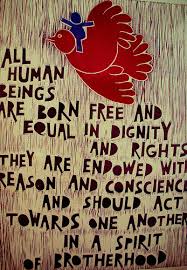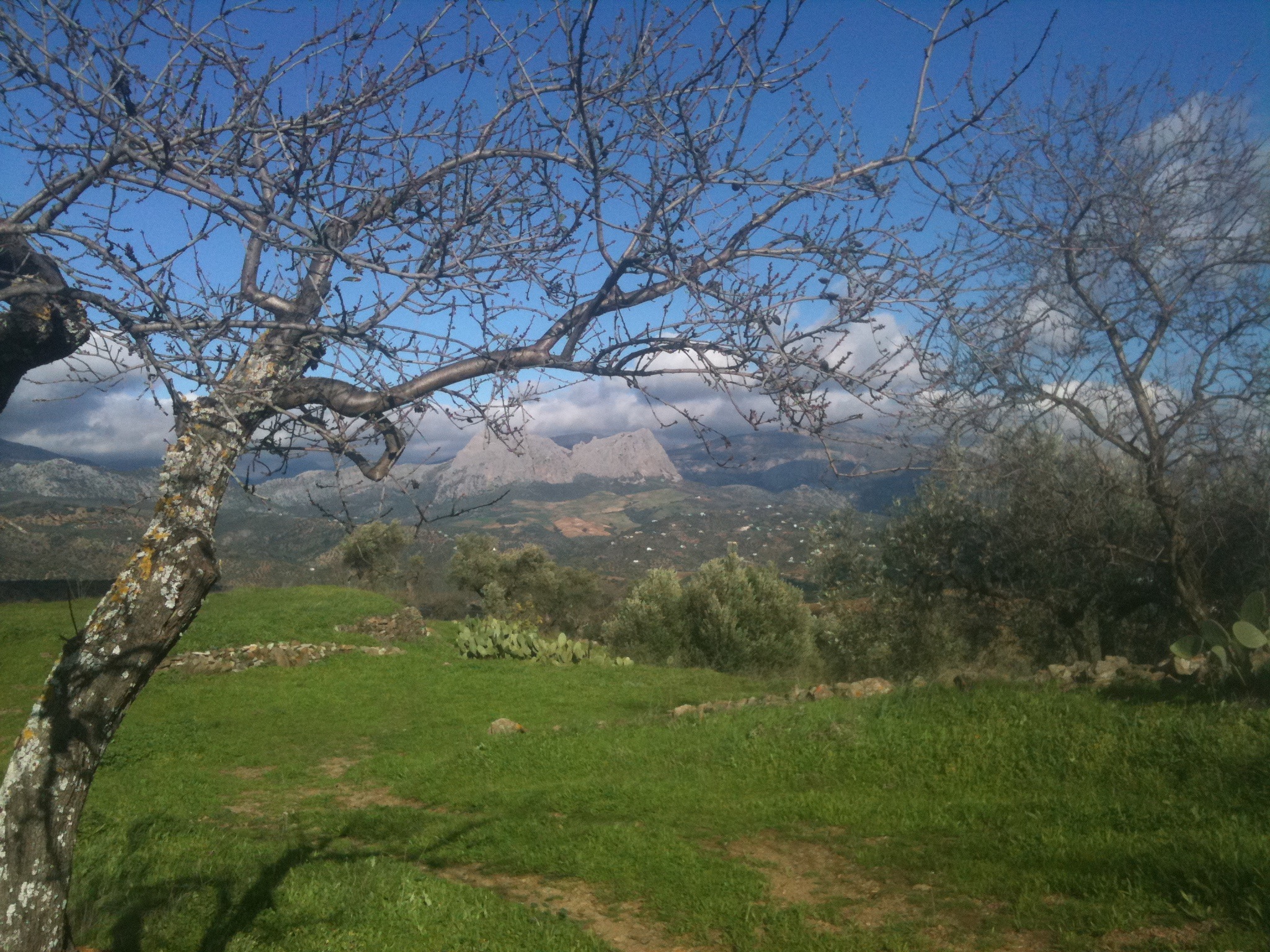So, you think it's warm all year round in Spain? Think again.
My village house is at 2,500 feet altitude, higher than anyone in the UK lives. And it's cold in winter. We sometimes get snow - only occasionally in the village but plenty on the hills around us. We are not far from the Sierra Nevada where the ski slopes opened early this year, at the end of November.
And as everyone who moved here from Britain will tell you, the houses aren't built to keep you warm in winter.
So round about now the expat internet forums are full of questions about wood deliveries, tips for using wood-burning stoves, and which type of radiators use the least electricity.
But there's an extra edge to the expat discussions this year. Because the British government, as part of the sweeping cuts which are affecting most of the poorest people in the country, is also planning to withdraw the Winter Fuel Allowance from British pensioners living in warmer countries.
 The English-language press in Spain has been full of this story, and in particular the letters pages. Outraged of Tunbridge Wells has retired and become Outraged of Torrevieja, penning strongly-worded letters, the indignation in which cannot be denied. "It's an outrage!" he writes. "I've paid my taxes" he fumes. "I moved here assuming I'd carry on getting that money" he explains. "They are driving a coach and horses through my human rights" he storms.
The English-language press in Spain has been full of this story, and in particular the letters pages. Outraged of Tunbridge Wells has retired and become Outraged of Torrevieja, penning strongly-worded letters, the indignation in which cannot be denied. "It's an outrage!" he writes. "I've paid my taxes" he fumes. "I moved here assuming I'd carry on getting that money" he explains. "They are driving a coach and horses through my human rights" he storms.
Well no. Actually they're not.
This "breach of our human rights" is bandied around here with depressing frequency. It came up earlier this year when it emerged that changes to the satellites means we many well cease to receive free UK TV programmes. That was apparently a breach of our human rights, too. I have to say, I find this misuse of the words abhorrent.
The Universal Declaration of Human Rights is an incredibly important document, to which we should all be eternally grateful. In the main, most people reading this probably don't need to be personally grateful for it. We are fortunate that the rights it enshrines are pretty much standard in the country of our birth and in our adopted country. But if its existence helps support people who have real struggles for shelter, education or water, or who have real struggles against slavery, hunger, arbitrary arrest or torture, then it is doing its job and I for one am relieved it is there.
And we devalue it when we wave it around inappropriately. I remember sitting on the patio at home in Dorset during school playtime and hearing a teenage girl scream at a teacher "You can't make me do homework, it's against my human rights!" It makes me no less angry when it is waved around by grown adults who have, at some point in their lives, been comfortable enough to be able to make a decision to emigrate to a warmer country to work or to retire. "Outraged of Torrevieja" did not, I suspect, arrive on the Spanish mainland in an over-crowded boat across the Straits of Gibraltar. He (or she) did not escape slavery or war to arrive wounded and starving in an urbanisation on the Costas. "Outraged" had the western European assumptions of freedom of movement and the capacity to take advantage of it, and came here by choice.
Once here, "Outraged" naturally hoped nothing would change. Life was good, the exchange rate gave him a good pension, and the sun shone. Then his human rights were trampled on. The £200 Winter Fuel Allowance may be withdrawn. This, apparently, will drop "Outraged" into abject poverty. He threatens to move back to the UK where he will still be eligible for the £200 allowance.
My view is not shared by the majority of immigrants here. I think that things are constantly changing around us, and mostly we just have to live with it. Because of the age I am, I first saw my state pension slip away over the horizon as my retirement age was upped from 60 to 65. Then I was caught in the next tranche of delays, and I will get mine at 66. Or perhaps at sixty-six and a half. Certainly I lose over six years from what I grew up expecting - so, £42,000 or thereabouts. Shame. But things change.
I think immigration is a bit like a marriage. We should take some sort of vows. For richer, for poorer. In sickness and in health. In warm weather and in cold weather. The rough with the smooth. Yes, Spain is lovely and warm for about eight and a half months, and really very cold for about three and a half months. Yes pensioners could do with the Winter Fuel Allowance. Or perhaps they could just drop €10 into a piggy-bank every time they go out for a Menú del Día at €7 or €8 a head for a three-course meal including a drink (I think €10 would be about how much is saved each time compared to prices if we'd stayed in the UK). Do that once a fortnight, or just once a month if there are two of you, and the savings give you back the Winter Fuel Allowance.
 Alternatively, we can just shrug at these administrative changes and look around us. Where do I want to live? If the answer is Spain, then we have to take the rough with the smooth. And be grateful that all thirty Articles in the Universal Declaration of Human Rights are still in place, unbreached, at least for us. There is no “Article 31 – the inalienable right to watch EastEnders or Strictly, however far away I move”, or “Article 32 – the inalienable right to move to another country and still receive every single one of the discounts or allowances available to those in the UK (while failing to mention the benefits arising from my new country)”. Just the 30. Fighting for a life free of torture, slavery and hunger, where education and participation in democracy are available to all. Those really matter.
Alternatively, we can just shrug at these administrative changes and look around us. Where do I want to live? If the answer is Spain, then we have to take the rough with the smooth. And be grateful that all thirty Articles in the Universal Declaration of Human Rights are still in place, unbreached, at least for us. There is no “Article 31 – the inalienable right to watch EastEnders or Strictly, however far away I move”, or “Article 32 – the inalienable right to move to another country and still receive every single one of the discounts or allowances available to those in the UK (while failing to mention the benefits arising from my new country)”. Just the 30. Fighting for a life free of torture, slavery and hunger, where education and participation in democracy are available to all. Those really matter.
© Tamara Essex 2013
THIS WEEK'S LANGUAGE POINT:
My intercambio friend had to write a paragraph in English about the area in which he lives. After I’d checked it for grammar (which was, as always, almost impeccable) he made me translate it into Spanish. He’s well ahead of me  on grammar so there were some difficult phrases. But I loved it, as there were some really beautiful-sounding section. I especially liked En invierno llueve poco, y aunque llueva, después los cielos aclaran y el sol brilla de nuevo. In winter it doesn’t rain much, and even when it does rain, afterwards the skies clear and the sun shines again. Nice bit of subjunctive in there … “… even when it rains …”. Es casi tan agradable como el paraíso. It’s almost as lovely as paradise. Very true, Jose, very true.
on grammar so there were some difficult phrases. But I loved it, as there were some really beautiful-sounding section. I especially liked En invierno llueve poco, y aunque llueva, después los cielos aclaran y el sol brilla de nuevo. In winter it doesn’t rain much, and even when it does rain, afterwards the skies clear and the sun shines again. Nice bit of subjunctive in there … “… even when it rains …”. Es casi tan agradable como el paraíso. It’s almost as lovely as paradise. Very true, Jose, very true.